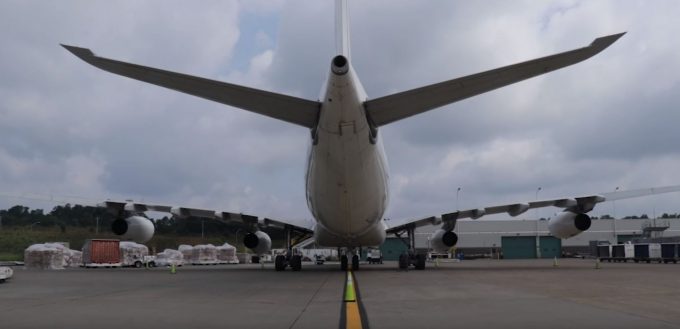US hit by fall in meat exports as China scales back and Brazil steps up
US meat exports are in low gear, affected by bans in the largest market, slowing ...
TFII: SOLID AS USUALMAERSK: WEAKENINGF: FALLING OFF A CLIFFAAPL: 'BOTTLENECK IN MAINLAND CHINA'AAPL: CHINA TRENDSDHL: GROWTH CAPEXR: ANOTHER SOLID DELIVERYMFT: HERE COMES THE FALLDSV: LOOK AT SCHENKER PERFORMANCEUPS: A WAVE OF DOWNGRADES DSV: BARGAIN BINKNX: EARNINGS OUTODFL: RISING AND FALLING AND THEN RISING
TFII: SOLID AS USUALMAERSK: WEAKENINGF: FALLING OFF A CLIFFAAPL: 'BOTTLENECK IN MAINLAND CHINA'AAPL: CHINA TRENDSDHL: GROWTH CAPEXR: ANOTHER SOLID DELIVERYMFT: HERE COMES THE FALLDSV: LOOK AT SCHENKER PERFORMANCEUPS: A WAVE OF DOWNGRADES DSV: BARGAIN BINKNX: EARNINGS OUTODFL: RISING AND FALLING AND THEN RISING

Pittsburgh International Airport (PIT) hopes to become the ‘Liege’ of the US – but also plans to lure in freighters with the promise of sustainable aviation fuel (SAF).
Nicely positioned between New York and Chicago, Pittsburgh has had a chequered history since 9/11 when passenger numbers shrank – although the vast majority of US carriers do operate there. But, along with several other secondary US airports, PIT sees growth in cargo.
“There was a huge gut punch when the steel industry left Pittsburgh, but the mentality is still there,” explained Bryan Dietz, SVP air service and commercial development, for PIT.
“We think there is a role for an alternative gateway airport; we want to leverage the geographic location, and be solution-oriented.”
At the moment, PIT sees freighters from FedEx, Amazon and UPS, along with ad hoc charters, as well as belly capacity from airlines including British Airways, Qatar Airways and Finnair. But it wants to cement its position as a cargo hub.
“We have the right geographic location and a ‘can-do’ attitude. We want to be the airport where you have a true partner, and help play matchmaker,” Mr Dietz told The Loadstar on the sidelines of the CNS Partnership even in Miami last week.
“We are where Liege (LGG) was 15 years ago. We’ve looked at how the cargo community is building there. We are a one-day truck drive from strong manufacturing bases – Pittsburgh is the largest employer in the medical industry. Pharma goes out of New York, but we have medical devices.”
Pittsburgh is also heavily focused on science and higher education, has a large robotics industry and is the US HQ for several German companies, such as Siemens and Bosch. PIT also has four runways, and a lot of space. It is building two warehouses as “we don’t want infrastructure to be a limit to growth”.
But Mr Dietz believes PIT will have an even bigger allure: sustainability.
The airport not only drills for natural shale gas on site, but it has developed a microgrid, which makes it energy self-sufficient. Some 9,000 solar panels power it, and it is expanding its solar capabilities, paid for by a third party.
“We didn’t want outages, we wanted dependable, predictable energy supplies,” explained Mr Dietz and added: “The area has a rich history in natural resources, and we think we can produce SAF on the airport property.
“There is insatiable demand, not enough supply, and we know we have the feedstock. We also have the storage infrastructure – we have storage capacity for 8.8m gallons of fuel. We think we consume 65m to 70m gallons a year – and we think we can produce more than that.”
Not transporting the fuel could mean lower SAF costs, he said.
“We see what is happening in Europe and we want to be part of it. This is like the steel revolution – but now we want SAF to revolutionise the area.”
It’s early days, and there is a ‘chicken-and-egg’ speculative feel to the projects. Mr Dietz acknowledges there are challenges.
“We are talking to everyone at the moment – handlers, shippers, forwarders, airlines. From this location we can serve multiple locations, including Detroit, Chicago, Toronto and New York.
“But our biggest challenge is that we don’t have much belly space, that all goes to JFK and ORD.”
However, PIT is determined to modernise the way airports work with stakeholders, with SAF a part of that plan.
“We will give as much attention to cargo as to passengers. We are on a mission to make sure that the airport industry gets better, and we hope it becomes contagious. We think airports should play a bigger role, and we can also leverage our natural resources. So let’s start doing something now.”
Comment on this article
Richard Zablocki
June 12, 2023 at 9:06 pmI have worked with Bryan Dietz and the PIT airport management team in the past and I can honestly say they have perhaps one of the best organizations to support air cargo operations. They truly offer a low cost and flexible style of operations that could function nicely as an air cargo hub for a cargo carrier looking to establish a North American center of operations.
Rich Zablocki
Former Air VP/CEVA (retired)